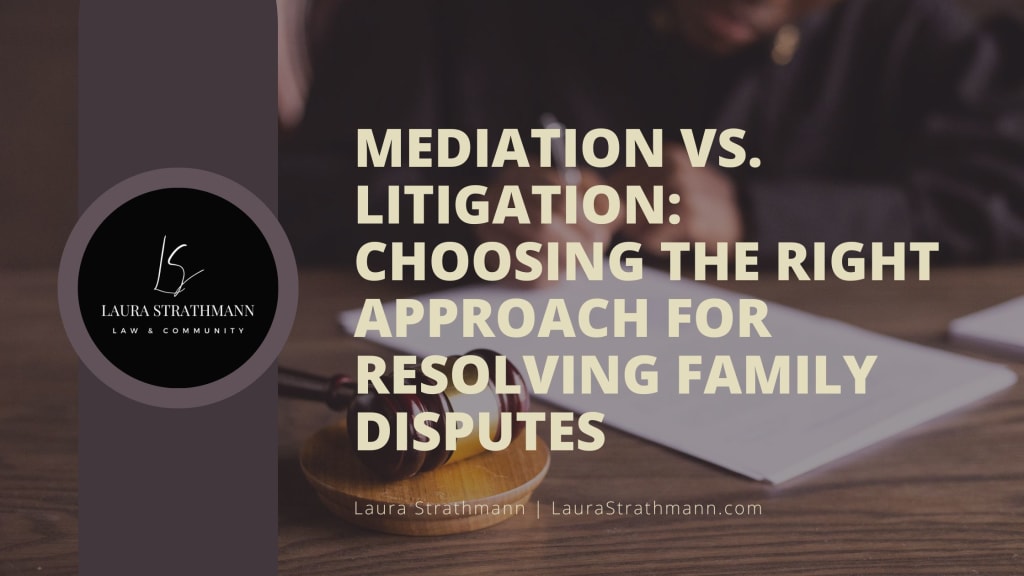Mediation vs. Litigation: Choosing the Right Approach for Resolving Family Disputes
Understanding the key differences between mediation and litigation.

Family disputes are common in our lives, whether it’s a disagreement over inheritance, child custody, divorce, or other familial matters. When these conflicts arise, it’s essential to consider the most effective way to resolve them. Two primary methods for resolving family disputes are mediation and litigation. Each approach has advantages and disadvantages, and choosing the right one can significantly affect the outcome and emotional toll on all parties involved.
Mediation: A Collaborative Approach
Mediation is a collaborative and non-adversarial method of resolving family disputes. In this process, a neutral third party, known as the mediator, facilitates communication between the parties involved. Mediators are trained professionals who help the parties identify their interests, communicate effectively, and work toward a mutually acceptable resolution.
One of the significant advantages of mediation is that it encourages open communication. Family members can express their concerns and feelings without fear of judgment or escalating conflict. This open dialogue often leads to more creative and personalized solutions that consider the family’s unique dynamics.
Mediation also tends to be quicker and more cost-effective than litigation. Court proceedings can drag on for months or even years, leading to exorbitant legal fees. In contrast, mediation typically involves fewer sessions and a shorter timeframe, making it a more affordable option for resolving family disputes.
Additionally, mediation can help preserve relationships. Maintaining a working relationship between family members is often crucial, especially when children are involved. Mediation can foster a sense of understanding and cooperation, allowing family members to continue their relationships after resolving the dispute.
Litigation: The Traditional Adversarial Approach
On the other hand, litigation is a more traditional and adversarial approach to resolving family disputes. It involves taking the matter to court, where each party presents their case to a judge. The judge then makes a decision based on the evidence and arguments presented.
While litigation provides a structured and formalized process for dispute resolution, it often comes with several drawbacks. First and foremost, it can be emotionally taxing and highly adversarial. Family members are pitted against each other in a courtroom setting, where the goal is to prove one’s case and discredit the other party’s arguments. This adversarial nature can escalate conflicts and further strain already fragile relationships.
Litigation is also time-consuming and expensive. Court proceedings can drag on for months or even years, leading to increased stress and financial strain on all parties involved. Legal fees, court costs, and the potential for appeals can make litigation expensive.
Furthermore, the outcome in litigation is typically binary: one party wins, and the other loses. This can lead to resentment and bitterness, making it challenging for family members to move forward and coexist peacefully after the resolution.
Choosing the Right Approach
When faced with a family dispute, choosing the right approach between mediation and litigation is crucial. Here are some factors to consider when making that choice:
Nature of the Dispute: Consider the nature and complexity of the dispute. Mediation is often more suitable for conflicts involving communication breakdowns or disputes where ongoing relationships must be maintained. Litigation may be necessary for more complex legal issues.
Cost and Time: Evaluate your budget, and the time you can commit to resolving the dispute. Mediation is generally more cost-effective and faster than litigation.
Emotional Impact: Consider the emotional toll the dispute has on all parties involved. Mediation can provide a more supportive and less confrontational environment for addressing emotional issues.
Desire for Control: Consider how much control you want over the outcome. Mediation allows more control and flexibility in crafting solutions, while litigation involves a judge making the final decision.
Legal Advice: Consult with an attorney to understand the legal implications of your dispute. They can help determine whether mediation or litigation is more appropriate for your case.
The choice between mediation and litigation for resolving family disputes is more than one-size-fits-all. It depends on the nature of the conflict, the parties involved, and their desired outcomes. Mediation offers a collaborative and less adversarial approach, often leading to more satisfying and long-lasting solutions. On the other hand, litigation provides a formalized process but can be emotionally draining and costly. Ultimately, the right choice is the one that best aligns with the unique circumstances of your family dispute.
About the Creator
Laura Strathmann
Based out of El Paso, Texas, Laura Strathmann is a highly accomplished legal professional with years of experience as a judge and attorney. In her free time, she invests in her community, volunteering and serving on various boards.






Comments
There are no comments for this story
Be the first to respond and start the conversation.